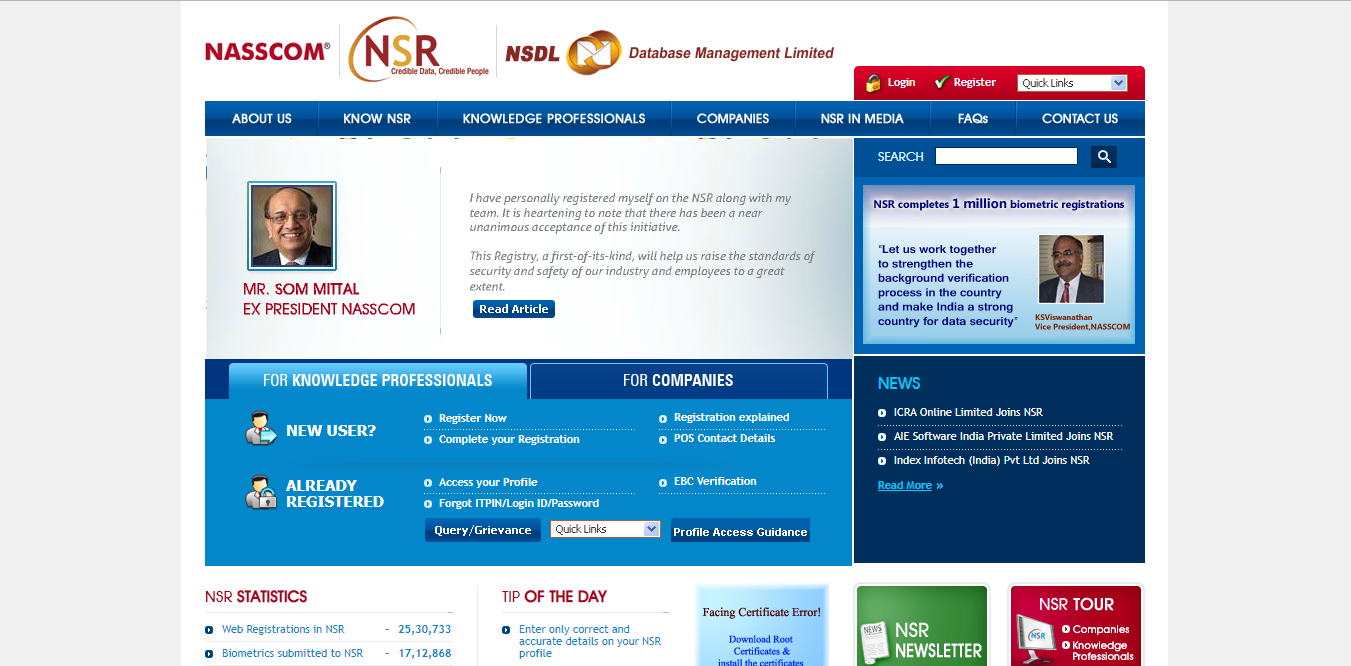One of the most difficult challenges for any business is filling skilled worker positions in the company. Success requires the right mix of skills. Any gap or weakness in skill, experience, expertise, and technical proficiency can hold the business back and keep it from gaining new work.
A challenge for any worker is letting prospective employers know the skills and experience you bring to a position. Looking for a new job often requires finding an edge or attracting attention to those critical skills you offer. Many times, you can lose out on the perfect job, not because you lack the skills or experience, but because the employer did not know you had them.
The National Skills Registry (NSR) works to solve these challenges through a managed database of credible information about the skills and expertise of the people working in the industry. Both potential employees and companies can use the NSR to connect workers with businesses that need them and build trust in the industry.
What is the National Skills Registry?

The National Skills Registry is owned and managed by the National Database Management Limited (NDML), which is a fully-owned subsidiary of the National Securities Depository Limited (NSDL).
NDML manages the National Skills Registry for NASSCOM, the National Association of Software and Services Companies. NASSCOM is a trade association for Indian Information Technology (IT) and Business Process Outsourcing (BPO) with more than 2000-member companies across the world.
NASCOMM focuses not only on promoting IT and BPO services, software development, and software services, but also on improving the service quality, talent recruitment outcomes, and level of service offered by IT and BPO companies. By improving the level of service quality, the organization can further promote member organizations and develop global trade.
The NSR helps in this mission by ensuring companies are hiring only the best-qualified employees for critical positions in IT and BPO.
NSDL designs, implements, and manages large databases across India, and specializes in data security. Security is critical in maintaining the NSR database.
Included in the National Skills Registry
The registry provides information on IT and BPO professionals. This information includes a sheet with background check reports that help ensure the identity of prospective employees.
The fact sheet includes the resume, qualifications, certifications, career information, and personal information — such as photo identification — for each registered professional.
Only the registered user can load information into the system. Likewise, only the user can modify the information included. Employers can verify information on their employees, but cannot change the information.
Any participating company can then authorize verification of the information in the fact sheet. Both the company and the user will be notified of the results of the verification.
Only the employer of a user or an authorized company can access the information. All access to the information is logged in the system. The NSR strives to keep your information completely confidential.
How to Use the National Skills Registry

The Registry includes features for both sides of the hiring and employment coin. We have included information about NSR registration for professionals who create profiles and businesses that become subscribers to use the NSR.
Registering Your Profile in the National Skills Registry
For the individual seeking work, the process for registering is not difficult:
- Create a National Skills Registry Profile: Go to the National Skills Registry website (www.nationalskillsregistry.com) and create a profile by clicking “Register for NSR.” When prompted, you’ll need to include the details of the company that has asked you to register. Enter credible and verifiable information in your profile. Be sure to include a resume and job history, as well as any certifications and schooling you may have earned. Keep the given password for access your profile later. Be aware that there is a fee for registering.
- Biometric Registration: All profiles in the NSR include biometrics to support the validity and credibility of the professional. You will need to visit a Point of Service (POS) center to record your biometrics and conduct the identity check. You can find a list of POS centers on the main website. Again, a fee is included.
- Proof of Identity: You will need to bring photo proof of identification to the POS center. This could include a passport, driver’s license, or a college ID card. You’ll also need an employer ID card if you have one. The Photo ID you provide is included in your profile.
Post-Registration
Once you have registered, you will receive an identification number, called an ITPIN, that gives you access to your profile.
From your profile, you should continue to update your personal information. Add new jobs or job skills when you receive them. If you continue education and certification programs, document these instances in your profile as well.
You can update your personal information when needed. It is up to you to maintain and update the profile with factual and correct information. Never let your profile become ridden with out-dated information.
You can also use the system to authorize anyone with access to your profile, including a prospective employer. You will have a complete record of who accessed your profile and the status of any background checks or verifications completed in your name.
There is a yearly fee for the use of the National Skills Registry. You will lose access to your profile if you do not pay the fee.
How Companies Can Use the National Skills Registry
The National Skills Registry connects workers in the IT or BPO industry with hiring companies. Businesses can use the NSR as a reference for hiring, accessing information on client assignments, or as a background check for a prospective employee. It is a quick and secure way to make sure you are hiring the right people.
The information included in a profile will cover the resume of a prospective employee. You will also find personal information including a photograph, qualifications, and career information. The system will provide source verification when requested to ensure the accuracy of information.
A company will need to subscribe to use the Registry, which does cost a fee. Once you are registered, you will have access to the full benefits of the NSR, which include:
Accurate and verified resumes
All facts on an applicant’s resume are verified. Within the system, you can see precisely how facts were verified and cross-checked to determine where and how discrepancies in the information were identified. You can also see any pending verifications, remarks, or notes.
User Access
You can assign Admin and Functional Users to your subscriber account. This will allow you to limit access to confidential employee information while still getting the full benefit of the NSR for authorized users.
Standard information
The registry promotes standard information on all resumes, ensuring transparency on applications and the ability to more accurately compare applicants.
Quick confirmation of an applicant’s credentials
With the system managing verification, you can quickly check the profile of an applicant to eliminate time spent with an unqualified person.
Once your business becomes a subscriber—either through membership in NASSCOM or when approved by the NSR—you should begin registering your existing employees and all job applicants. This will give you a permanent, credible profile for your employees. The profile also serves as a record of employment and an easy place to update new skills and experience.
Concern for Security
There continues to be some concern about the privacy and data security of the NSR. The system holds the biometric information of more than 1.6 million registrants and provides subscribers access to that information.
There is a risk for abuse, especially since employers have access to verify and comment on employee information. A sense of courtesy and professionalism are essential to implementing the system in a positive way.
If professionals and companies use the National Skills Registry as intended, it can help build a connection between companies and provide a greater sense of trust in the companies included.
Getting the Most from the National Skills Registry

This database is a powerful tool for professionals in the IT and BPO industries, as well as software developers, network services, software services, e-commerce, and related technical fields. The web-based tool gives an objective perspective on service professionals.
It’s also an excellent way to increase the credibility of companies. Once you have your employees registered, clients and customers can verify the skills and experience of the people working for them.
The record and experience of work of each professional included in the registry have been verified. Companies reviewing applicants and businesses know the importance of verification. It increases trust and professionalism in the industry and benefits everyone.

 IntelliJ vs Eclipse: Which To Use For Java Development
IntelliJ vs Eclipse: Which To Use For Java Development